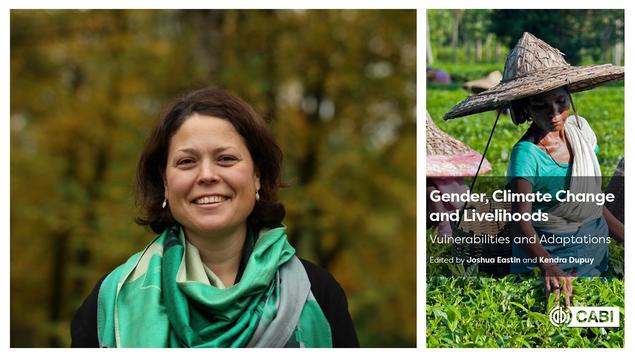Climate change, gender, and livelihoods: A call for more research

In the recently published edited volume “Gender, Climate Change and Livelihoods”, FNI researcher Dr. Kendra Dupuy and coauthors examine the linkages between climate change and livelihoods in developing countries.
World leaders are currently meeting in Glasgow, Scotland during the first two weeks of November as part of the United Nations Climate Change Conference (COP26). The world is already witnessing the negative effects of climate change with the increase in deadly wildfires, flooding, and heat waves. These dramatic changes in the climate have direct impacts on ecosystems and on the availability and quality of natural resources. In turn, these changes negatively impact on people’s livelihoods, defined as the capabilities, assets, and activities required to make a living. And it is the more marginalized groups in society that will bear the brunt of climate change’s negative livelihood effects, most notably women and the poor in low-income countries.
In the recently published edited volume “Gender, Climate Change and Livelihoods”, FNI researcher Dr. Kendra Dupuy and co-author Dr. Joshua Eastin (Associate Professor of Political Science, Portland State University) and a set of authors from around the world examine the linkages between climate change and livelihoods in developing countries. The contributions examine the impact of climate change on how men and women earn income and access the natural, social, economic, and political resources necessary to survive and thrive. The chapters cover diverse issues ranging from how climate change impacts the gendered dynamics of food security in Uganda; the linkages between domestic violence, livelihoods, and climate change in Indonesia; the gendered differences in awareness and adoption of climate-smart agriculture practices in Bangladesh; and the nexus between climate adaptation, disasters, and gendered livelihoods.
The book highlights six key points about the relationship between gender, climate change and livelihoods. First, climate change is a gender issue. Second, the gender implications of climate change are not universal. Third, climate change generates a range of outcomes for women and their livelihoods. Fourth, a laissez faire approach by governments to the gendered dynamics of climate change’s livelihoods impacts is counterproductive. Fifth, public policy is extremely important in managing those gendered impacts. And sixth, women and men exercise agency in taking charge of their livelihoods in the face of climate change.
While the book is an important contribution to the scholarly literature on gender, climate change, and livelihoods, it also highlights that there are many research gaps that urgently need to be addressed on this topic. There is a need for gender-disaggregated quantitative and qualitative climate change data, more longitudinal research to understand climate change’s effects over time, more cross-country and within-country comparative research (especially on under-studied contexts), more focus on the interlinkages between the various effects of climate change (for instance, on health, household relationships, and finance), and more focus on the effects of climate policies.

3 Comments
TEST - Merete Nor Midtskog TEST
benefits of transcranial magnetic stimulation
benefits of transcranial magnetic stimulation
https://www.brainhealth-solutions.com/